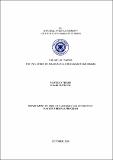JavaScript is disabled for your browser. Some features of this site may not work without it.
| dc.contributor.author | ÖZPİRİNÇ, MİKAİL
|
|
| dc.date.accessioned | 2021-05-31T06:30:16Z | |
| dc.date.available | 2021-05-31T06:30:16Z | |
| dc.date.issued | 2019 | |
| dc.identifier.uri | http://hdl.handle.net/11547/8669 | |
| dc.description.abstract | Niccolo Machiavelli famously outlined the traits of an ideal ruler in his two most well-known books, The Prince and Discourses. The collection of his thoughts came to be known, and disparaged, as Machiavellianism, and remains a long-lasting area of fascination for literary and particularly dramatic output. Although Machiavelli is accepted as the founder of modern politics, his subject not limited to the area of governance, but extends into many aspects of social life, including human relations, religion and personal interest. William Shakespeare and Christopher Marlowe‘s translations of Machiavellian thought to the Elizabethan stage plays a huge role in the way in which Machiavelli as a Renaissance thinker evolved into the notorious figure we know today. From teacher of princes, he came, through misinterpretation and misquotation, to be known as ‗the teacher of evils‘. The characters created by those playwrights and which brought the name of Machiavelli such notoriety are commonly understood to be the ―Machiavellian villain, stage villain or supervillain‖ by scholars of the Elizabethan stage. For the purposes of this thesis, this thesis gathers these appellations under a single and new title, that of the Machia-villain, a figure who stands for solely the darkest side of Niccolo Machiavelli‘s dictums. | tr_TR |
| dc.subject | Machiavellian villain | tr_TR |
| dc.subject | Elizabethan Drama | tr_TR |
| dc.subject | Machia-villain | tr_TR |
| dc.subject | Barabas, Marlowe | tr_TR |
| dc.title | THE INFLUENCE OF MACHIAVELLI ON ELIZABETHAN DRAMA | tr_TR |
| dc.type | Thesis | tr_TR |
Files in this item
This item appears in the following Collection(s)
-
Tezler -- Thesis [3470]
